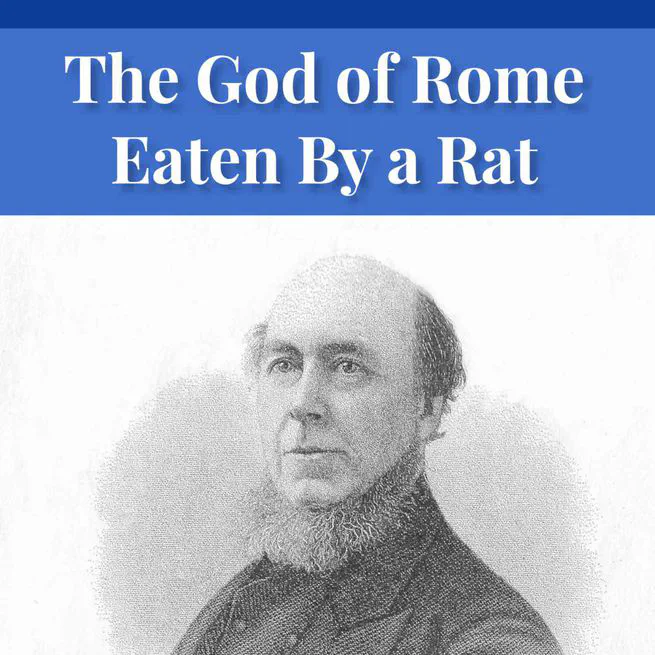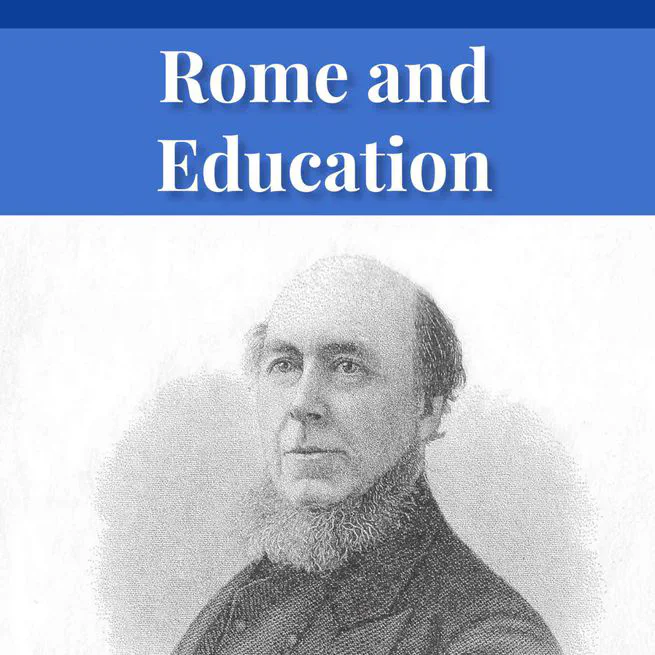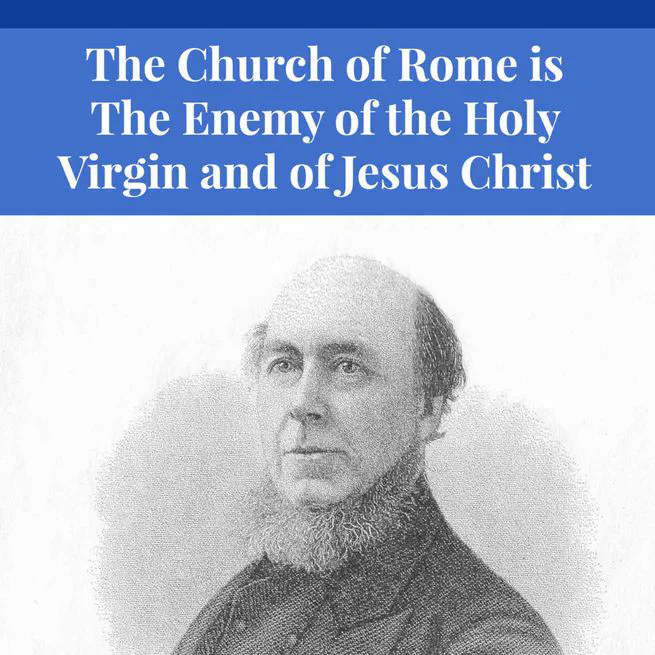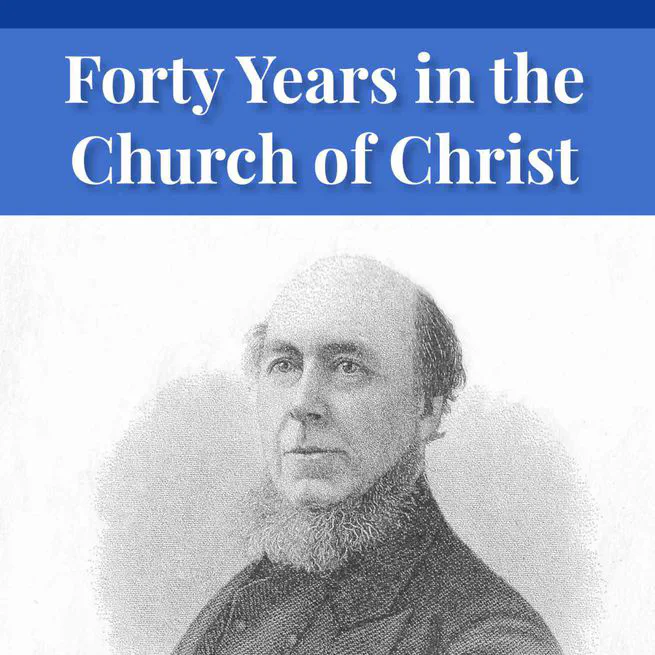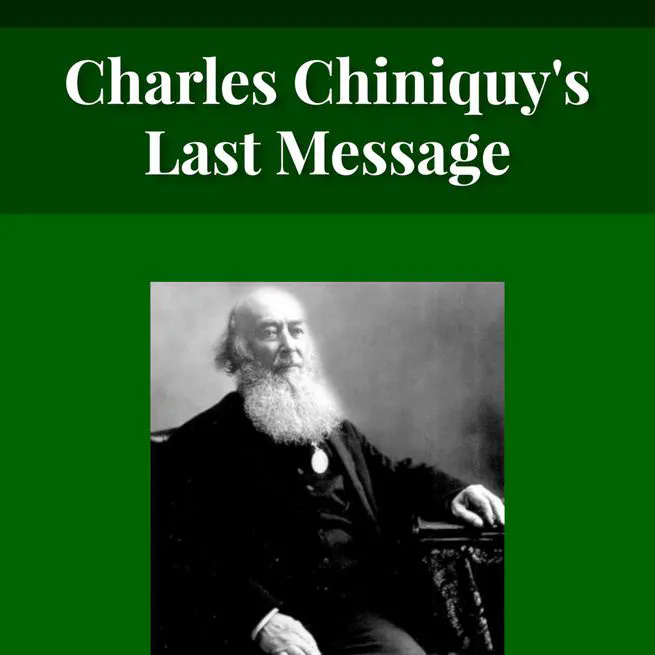Charles Chiniquy
Bio from Charles Chiniquy’s Last Message
Father Chiniquy was born in the town of Kamoraska, Canada, on 30th July, 1809. From his infancy he was taught the Scriptures by his pious mother, and got to love so many of the chapters that he committed them to memory. When only nine years of age he had learnt by heart the history of the creation and fall of man, the deluge, the sacrifice of Isaac, the history of Moses, the plagues of Egypt, the hymn of Moses after crossing the Red Sea, the most interesting events in the life of David, several Psalms, the parables of Christ, and the whole history of our Saviour as narrated by John. Father Chiniquy thus describes an incident in his early life which much impressed him: —
“One day when I was at home with my parents the priest of the village came on a visit. His name was Rev. Mr. Courtois, a man of unpleasant appearance. This priest was born in France where he had a narrow escape of being condemned to death under the administration of Robespierre. He found a refuge, however, first in England and latterly in Canada. On this occasion he addressed my father, ‘Mr. Chiniquy, is it true that you and your child read the Bible?’
“‘Yes, sir,’ was the quick reply ‘we do, and what is more my little boy has learnt by heart a great number of its most interesting chapters. If you will allow it, Mr. Curate, he will give you some of them.’ ‘I did not come for that purpose,’ abruptly replied the priest, ‘but do you not know that you are forbidden by the holy council of Trent to read the Bible, and that it is my painful duty to get the Bible from you and burn it.’
“Quick as lightning my father was on his feet, while I clung trembling to my mother’s gown. My father’s anger was terrible, and I feared a violent scene was about to take place for he paced the room with a double quick step, his lips pale and trembling. The priest closely watched my father’s movements, his hands pressing his heavy cane, and his face giving the evidence of a too well grounded terror.
“‘Sir,’ said my father, ‘is that all you have to say here?’ ‘Yes, sir,’ said the trembling priest. ‘Well,’ added my father, ‘you know the door by which you entered my house, please take the same door and go away quickly.’ The priest went out immediately. I felt an inexpressible joy when I saw that my Bible was safe. I ran to my father’s neck, kissed him, and thanked him for his victory, and to pay him in my childish way I jumped upon the table and recited in my best style the fight between David and Goliath. Of course, in my mind, my father was David and the priest of Rome was the giant whom the little stone from the brook had stricken down. Thou knowest, O God, that it is to that Bible read at my mother’s knee I owe the knowledge of the truth today; that the Bible had sent to my young heart and intelligence ray; of light which all the dark errors of Rome could never completely extinguish.”
When Chiniquy was twelve years old his father died. Shortly after the funeral they were again visited by Rev. Mr. Courtois who demanded money from the poor widow in order that prayers should be made for the deliverance of her husband from the flames of purgatory. Mrs. Chiniquy had been left quite penniless, and told the priest so, “but,” she added, “you see that cow in the meadow not far from the house; her milk and the butter made from it form the principal part of my children’s food. I hope you will not take her away from us. If, however, such a sacrifice must be made to deliver my poor husband’s soul from purgatory, take her as payment of the masses to be offered to extinguish those devouring flames.” “Very well,” said the priest, and deliberately directing his steps towards the meadow he drove the cow before him in the direction of his home.
In the month of August, 1829, Chiniquy finished his classical course of study in the college of NiColet, and on 4th May, 1833, irrevocably consecrated himself to the Church of Rome by taking the vow of celibacy and accepting the office of sub-deacon. It was not, however, till 21st September, 1833, that he was raised to the priesthood in the cathedral of Quebec. “No words,” he says, “can express the solemnity of my thoughts when the delegate of the Pope, imposing his hands on my head, gave me the power of converting a real wafer into the real substantial body, blood, soul, and divinity of Jesus Christ! The bright allusion of Eve as the deceiver told her ‘Ye ‘shall be as Gods,’ was child’s play with what I felt when assured by the voice of my church that I was not only on equal terms with my Saviour, but I was in reality above Him, and that hereafter I would not only command but create Him!”
Father Chiniquy was a faithful priest of Rome, and performed the duties which devolved upon him with the utmost conscientiousness. He thus describes his first administration of the Mass: “When the bell rang to tell me that the hour was come to clothe myself with the golden priestly robes and go to the altar, my heart beat with such a rapidity that I came very near fainting. The holiness of the action I was to do, the infinite greatness of the sacrifice I was about to make, the Divine Victim I was to hold in my hands and present to God the Father, the wonderful miracle of transubstantiation I was about to perform, filled my soul. and my heart with such sentiments of terror, joy, and awe, that I was trembling from head to foot.
“It is not an easy thing to go through all the ceremonies of the Mass. There are more than one hundred different ceremonies and positions of the body which must be preserved with the utmost perfection. To omit one of them willingly is eternal damnation. To make one’s self believe that he can convert a piece of bread into God requires such a supreme effort of the will, and complete annihilation of intelligence, that the state of the soul after the effort is over is more like death than life. I had really persuaded myself that I had done the most holy and sublime action of my life, when in fact I had been guilty of the most outrageous act of idolatry.
My eyes, my hands and lips, my mouth and tongue, and all my senses, as well as the faculties of my intelligence were telling me that what I had seen, touched, eaten, was nothing but a wafer; but the voices of the Pope and his church were telling me it was the real body, blood, soul, and divinity of the Lord Jesus Christ. I had persuaded myself that the voices of my senses and intelligence were the voices of Satan, and that the deceitful voice of the Pope was the voice of the God of truth. Every priest of Rome has to come to that strange degree of folly and perversity every day of his life to remain a priest of Rome.”
In 1836 Father Chiniquy almost fell a victim to a typhoid epidemic which raged with disastrous effects in Quebec. It was of so acute a form that nearly every one attacked succumbed in about 12 days. On the ninth day of his illness he was told there was no hope of his recovery. He was quite resigned to his fate, and invoked all the saints in heaven, beginning with the Holy Virgin Mary, that. they might pray God to look down upon him in mercy and save his soul. On the thirteenth night, as the doctors were retiring, they whispered to his friends, “He is dead, or if not he has only a few minutes to live. He is already cold and breathless, and we cannot feel his pulse.” Chiniquy, however, heard these words, and was suddenly seized with the idea that perhaps he would be buried alive. No words can express the sense of horror he felt at the idea. At that supreme moment he tried to think of what chance he had of salvation, invoking the help of the blessed Virgin Mary. But a terrible vision crossed his mind. Remembering the doctrine of the church that “only those go to heaven who have never offended God, or who, having offended Him, have done penance,” he saw all his good works and penances in the balance of the justice of God. These were on one side of the scales and his sins on the other; but his good works seemed only as a grain of sand as compared with the weight of his sins! In this dreadful moment he felt it was useless to pray to God, so turned his thoughts to two female saints, St. Anne and St. Philomene, beseeching them to pray that his life might be spared to enable him to do more penance. He believed at this moment that he saw these saints and heard them say, “You will be cured.” Strange to say, just as this happened the crisis of the fever seemed to have passed, and he felt his strength suddenly returning to him. To the amazement of the friends who believed him dead, he stretched out his bands, which he had not moved for three days, and said, “I am cured. Please give me something to eat; I am hungry.”
Some food was brought, and as Chiniquy eat it ravenously, and talked in a cheerful though feeble voice of his recovery, they could scarcely believe their eyes. He firmly believed that he was restored by the intercession of the two saints. One of his doctors was a Protestant, however, and told him subsequently that he could not believe in his theory about the miraculous intervention of the saints, but that the so-called vision was simply the turning-point of the disease.
“There is nothing so difficult, however, as to persuade a man who does not want to be persuaded,” and Father Chiniquy clung tenaciously to the vision theory, and even went the length of having a magnificent picture painted representing himself lying on a bed with the saints hovering above him. This he presented on a special occasion to the church of St. Anne, more than 10,000 people being collected inside and outside the walls of the church.
In the course of time, however, as Father Chiniquy became more acquainted with the so-called power of the saints he began to see. that after all his marvelous recovery through the mercy of God, had been due to natural causes and not the result of the saints’ supplications.
Father Chiniquy was a strong temperance advocate, and was the means of starting and carrying on many temperance societies, often, however, against the bitter Opposition of his fellow-priests. So much was he identified with the cause of ’ temperance that he was known as the “Canadian Apostle of Temperance.”
But during all these years Chiniquy’s faith in the doctrines of the Romish Church was slowly but surely crumbling to the ground. He struggled hard against these seasons of doubt, but one by one he found himself irresistibly compelled to reject the fundamental beliefs of Roman Catholicism, and finally, after a most extraordinary series of persecution and vicissitudes which would have daunted the courage of most men, he severed his connection with the Church of Rome forever. He thus describes his extraordinary experience when he took that supreme step. He had just had a stormy interview with his bishop, to whom he had admitted that he could no longer submit to his ruling or further teach the doctrine of the Church.
“‘If that be so, sir,’ said the bishop, ‘you can no longer be a Roman Catholic priest.’ I raised my hands to heaven, and cried aloud, ‘May God Almighty be forever blessed.’ I took my hat and left to go to my hotel. When alone in my room I looked the door and fell on my knees to consider, in the presence of God, what I had just done. ‘My God,’ I cried, ’the Church of Rome is not Thy Church. To obey the voice of my conscience, which is Thine, I give it up. When I had the choice of giving up that church or the Bible I did not hesitate; I could not give up Thy Holy Word. I have given up Rome; but, O Lord, where is Thy Church? Where must I go to be saved? Just then my eyes fell on these words in the New Testament, ‘Ye are bought with a price.’ ‘Be not ye the servants of men.’ They at once brought a great and delightful calm to my soul. I said to myself, ‘Jesus has bought me, then I am His. My salvation must then be a perfect salvation, and if Jesus has perfectly saved me by shedding His blood on the Cross, I am not saved, as I have thought and preached till now, by my penances, my prayers to Mary and the saints, my confessions and indulgencies, or the flames of purgatory.’ At that instant all the mummeries by which the poor Roman Catholics are so cruelly deceived—the Chaplets, indulgencies, scapularies, auricular confession, invocation of the Virgin, holy water, masses, purgatory,etc.— vanished from my mind as a huge tower when struck at the foundation crumbles to the ground. Jesus alone remained in my mind as the Saviour of my soul.”1
Father Chiniquy immediately intimated his conversion to the church of which he had charge, and to his great joy the entire congregation of over 1,000 persons severed their connection with the Church of Rome along with him. This number rapidly increased till, on the 15th of April, 1860, Father Chiniquy formally joined the Presbyterian Church along with 2,000 converts. He continued to be mightily used in the Gospel till the day of his death at the advanced age of 90.
We are indebted for the short extracts in the foregoing to the volume “Fifty Years in the Church of Rome,” by Father Chiniquy. ↩︎
